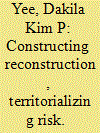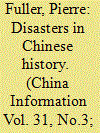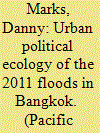|
|
|
Sort Order |
|
|
|
Items / Page
|
|
|
|
|
|
|
| Srl | Item |
| 1 |
ID:
157944


|
|
|
|
|
| Summary/Abstract |
Analysis of post-disaster reconstruction of urban areas has largely been understood as a function of technocratic and institutionalist paradigms, while critical perspectives have been largely influenced by the analysis of “disaster capitalism.” Common to these paradigms is little analysis of state attempts to deploy power over a population through controlling space in urban areas. This paper examines the strategies of internal territorialization undertaken by the Philippines state in post-Haiyan reconstruction polices. Drawing on data from Tacloban City, I show how bourgeois environmentalist and urban ecological security approaches exclude the urban poor from undertaking reconstruction in coastal communities. Discourses of cleanliness and securing the population of the city have accompanied material practices that enforce state territorialization in the city. These processes of state territorialization exclude those residing in risk prone zones from various forms of aid and relief. This paper concludes by highlighting processes of territorialization that have generated conflict in the city, as poor residents engage in forms of counter-territorialization to assert their space in the city.
|
|
|
|
|
|
|
|
|
|
|
|
|
|
|
|
| 2 |
ID:
156524


|
|
|
|
|
| Summary/Abstract |
Scholars in various disciplines have recognized that ‘natural’ disasters – and the extent to which natural hazards develop into humanitarian catastrophe – can reveal fundamental aspects of any particular government or society. What does history offer observers of disasters in contemporary China? What was the Chinese experience of environmental or natural disasters in pre-revolutionary or even premodern times? As recently as the early 2000s, the field of Chinese history offered little to answer such questions. Meanwhile, web searches remain the predominant avenue for non-academic researchers seeking historical contextualization, yet online searches on the vast majority of disasters in Chinese history continue to produce negligible results. With this in mind, a group of historians launched the website DisasterHistory.org in autumn 2015. Emerging now from its pilot stages, the site’s goals are to serve as an online introductory portal for academic studies and sources on Chinese disasters, to provide an accessible and reliable ‘go-to’ resource for academic researchers generally, and to create a forum for data-sharing and collaborative research for scholars across disciplines with shared interests in disasters, broadly defined.
|
|
|
|
|
|
|
|
|
|
|
|
|
|
|
|
| 3 |
ID:
140391


|
|
|
|
|
| Summary/Abstract |
Informal sector actors played a key role in Mumbai’s resilience to disastrous floods in 2005. Members of small-scale retail and service sector businesses, the city’s underclass, its waste workers and scrap dealers and sundry individual tradespersons such as electricians, plumbers, masons and sanitary workers were at the heart of recovery and rehabilitation in the weeks following the floods of July 2005. These floods not only affected significant parts of the city’s new Central Business District (CBD) and business sectors but also its poor and marginalized communities that lived in environmentally fragile and marginal locations. Ironically, these actors have also been at the receiving end of distorted urban planning initiatives, real estate growth, bourgeois environmentalism-inspired middle-class activism and ethnic chauvinist political forces which have pushed them to the city’s social, economic, and spatial margins. Hence, the aforementioned reasons have made the lives and livelihoods of these actors quite precarious and insecure. Going with recent sociological attempts to bridge the expanding field of disaster studies and classical sociological theorization by linking development theories to the study of disasters and their social implications, this paper argues for more imaginative disaster mitigation and management strategies that recognize the role of informal sector workers in post-disaster resilience. It is argued that this recognition should be accompanied by formal state sponsored institutional inclusion and integration of informal sector workers and actors in disaster governance. In Mumbai, informal economic actors were characterized by resourcefulness, access to key networks in enabling recovery, flexibility and innovativeness in design and planning, and the ability to offer low-cost options which could be rapidly deployed. These tend to contrast with the slowness and cumbersome procedures and responses that typify formal state and private responses to disasters. Given the feeble response mechanisms of state institutions in disaster management and mitigation in much of the developing world, and the established fact of citizen action being the first to respond to disaster situations, this paper suggests that paying attention to and involving informal sector actors in disaster governance can both augment the quality of disaster management and enhance the possibility of greater integration of the city’s marginalized and excluded groups into its mainstream social fabric.
|
|
|
|
|
|
|
|
|
|
|
|
|
|
|
|
| 4 |
ID:
140394


|
|
|
|
|
| Summary/Abstract |
This paper uses an urban political ecology analysis to question the discourses used by Thai government leaders about the causes of the 2011 floods in Bangkok and the solutions that they have proposed in response. In contrast to their argument that the main causes of the floods in Bangkok were climate change and nature, it argues that the causes of the 2011 are compound. They are a result of human-nature interactions: while Thailand did receive heavy rainfall that year, a number of human activities interacted with this heavy rainfall to create the floods. During the past few decades, local political elite have risen to power and profited the most from Bangkok’s urbanization activities while changes to the physical environment of Bangkok made those living there more vulnerable to floods. These activities include massive land use change and concretization which drastically increased run-off, over-pumping of groundwater and the filling of canals. During the past few decades, the local political elite profited the most from Bangkok’s industrialization and urbanization activities while changes to the physical environment of Bangkok made those living there more vulnerable to floods. Further, both the local and national’s government overreliance on antiquated and poorly-maintained infrastructure made the city more vulnerable to the 2011 floods. In 2011, human decisions, particularly by politicians, about where to direct and block water heavily influenced which groups were most vulnerable. As a result, the inner city were protected at the expense of those living in the city’s peripheral areas. Further, the low institutional capacity of the state, at both the local and national level, diminished the state’s capacity to reduce the risks of floods. Analyses of disasters in urban areas need therefore need to consider how discourses, socio-political relations, and ecological conditions shape governance practices of disasters.
|
|
|
|
|
|
|
|
|
|
|
|
|
|
|
|
|
|
|
|
|